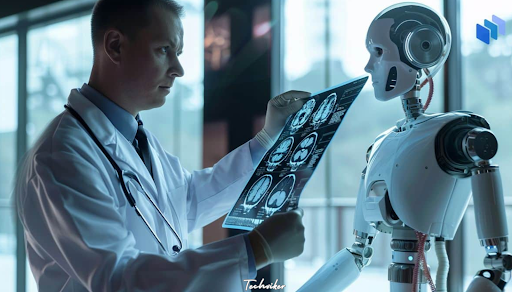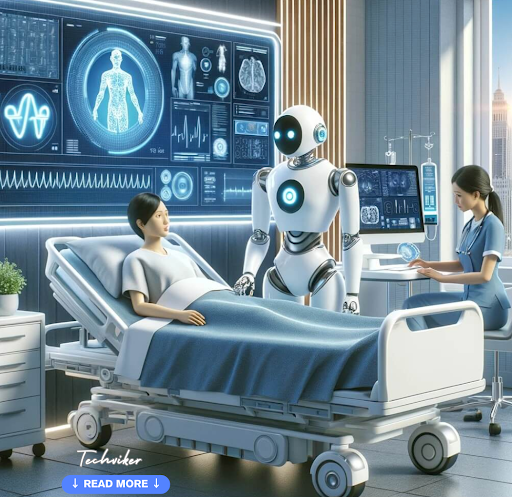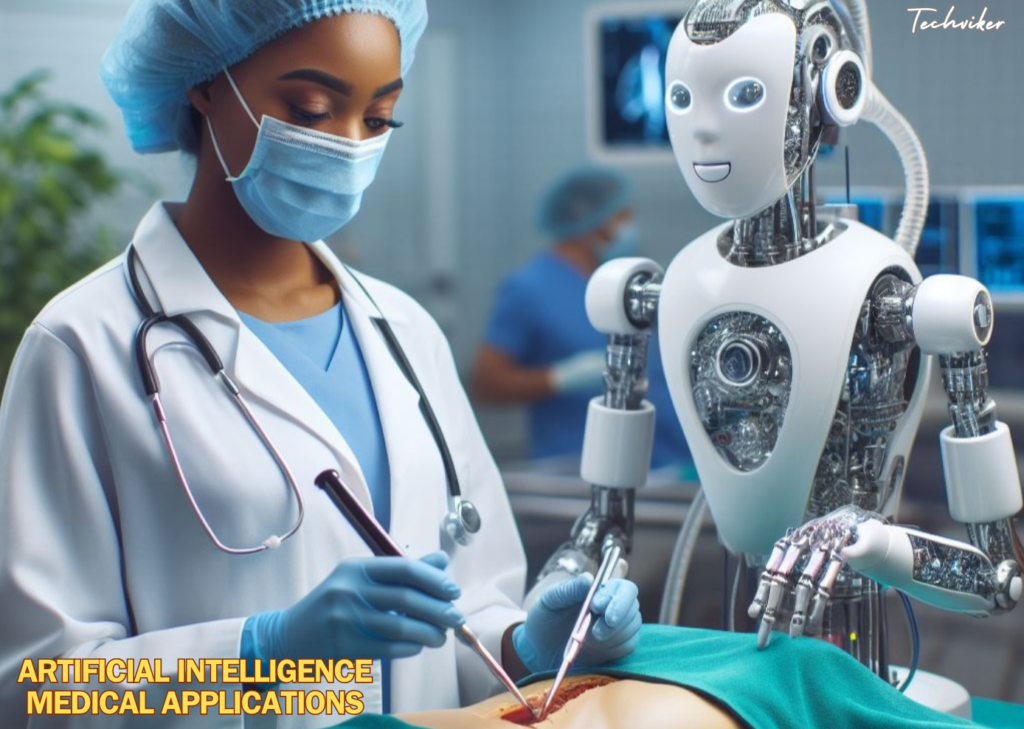The Role of Artificial Intelligence in Transforming Healthcare

The development of AI is starting to take shape as a fundamental component of modern healthcare. Artificial intelligence in healthcare plays a major role by radically changing how medical personnel approach patient care and clinical decision-making, not only by automating mundane jobs. Healthcare systems are seeing major breakthroughs in areas like illness detection, treatment customization, and operational efficiency because of the use of AI.
Healthcare professionals now evaluate enormous volumes of data with previously unheard-of speed and precision thanks to AI technology, which improves patient outcomes and helps them make better decisions. This technology revolution is creating the conditions for more accurate, efficient, and patient-specific healthcare in the future.
Introduction to Artificial Intelligence in Healthcare
An emerging discipline called artificial intelligence in healthcare uses sophisticated computer methods to improve a number of facets of medical practice. AI is quickly becoming a vital tool in modern health, from automating repetitive procedures to offering sophisticated analytical insights.
Healthcare Transformation with AI

Streamlining Administrative Processes
AI immediate effects on healthcare include the simplification of administrative procedures. Traditional healthcare systems were inefficient due to long wait times alot of paperwork, and high operating costs. AI-driven solutions make it feasible to automate procedures like patient data management, appointment scheduling, and billing. AI frees up medical staff administrative workload so they may focus more on patient.
Improving Clinical Decision Making
The impact of AI on improving healthcare decision-making cannot be enhanced. AI systems look through vast amounts of patient data such as imaging scans, test results, and medical histories to deliver insightful analysis. By using these tools, doctors may make more informed decisions that lead more accurate diagnoses and customized treatment plans. AI-driven decision support systems improve treatment quality and productivity, making them a need in modern clinical practice.
Optimizing Resource Allocation
AI is also essential for maximizing the use of resources in healthcare institutions. Hospitals may more efficiently manage workforce levels and equipment utilization by using predictive algorithms to estimate patient intake. This optimization ensures that resources are used effectively while lowering wait times and raising patient satisfaction.
Artificial Intelligence in Healthcare Applications

Radiology and Diagnostic Imaging
Diagnostic imaging is one of most widely used uses of AI in medicine. AI systems are highly accurate while scanning medical pictures, including CT, MRI, and X-ray scans. These devices identify anomalies that human radiologists would miss, such tumors or fractures. AI helps with early identification, which greatly improves patient outcomes and makes treatment regimens more successful.
Personalized Medicine
AI is a breakthrough tailored medicine by assessing each patient’s distinct genetic profile and medical history. By examining large datasets, AI discovers trends and correlations that help customize therapy to meet the unique requirements of each patient. This customized approach maximizes treatment efficacy while lowering the risk of adverse consequences.
Drug Discovery and Development
AI speeds up the drug-discovery process by predicting the interactions between various chemicals and biological targets. Conventional drug development is a costly and time-consuming process that might take years. By detecting and forecasting the efficacy of prospective drug candidates, AI models expedite this process and lower the time and expense involved in introducing new medications to the market.
Machine Learning in Medicine
Predictive Analytics
Machine learning mostly focuses on predictive analytics, which uses algorithms to assess current and historical patient data to forecast future health events. These prediction algorithms can forecast the likelihood of sickness, potential issues, and treatment outcomes. For example, AI algorithms are able to predict a patient’s likelihood of developing chronic conditions like diabetes or heart disease, which allows for early detection and preventive care.
Enhancing Diagnostic Accuracy
By continuously learning from large volumes of data, machine learning improves diagnosis accuracy. Artificial intelligence (AI) systems may identify subtle or complicated patterns in patient records and medical imagery. This capacity supports physicians in providing high-quality treatment by aiding in the more accurate and efficient diagnosis of illnesses.
Personalized Treatment Plans
Treatment strategies that are tailored to each patient are also made possible by machine learning algorithms. AI can identify the best treatments for specific patients by evaluating patient data, including genetics and treatment outcomes. This individualized strategy lowers the chance of adverse responses while simultaneously improving treatment outcomes.
AI for Disease Diagnosis

Early Detection of Diseases
AI for Illness Significant progress is being made in early illness identification through diagnosis. In order to provide possible diagnosis, AI systems examine patient data and symptoms. AI systems, for example, may examine pathology slides to find malignant cells before they show symptoms. Early identification can greatly increase patient survival rates and is essential for effective treatment.
Diagnosis of Rare and Complex Conditions
AI is also quite good at diagnosing complicated and uncommon diseases. These illnesses, which are frequently difficult because of their complexity and rarity, profit from AI’s capacity to examine large datasets and spot trends that human physicians would overlook. AI technologies can help with uncommon condition diagnosis, guaranteeing that patients obtain prompt and accurate diagnoses.
AI-Enhanced Diagnostic Tools
Integrated Data Analysis: Combines clinical, imaging, and genetic data for a detailed view.
Diagnostic Assistance: Supports healthcare professionals in making precise diagnoses.
Efficient Workflow: Increase efficiency of the overall diagnostic process within healthcare settings.
Challenges and Future Prospects
Data Privacy and Security
Even with all of the advantages, data security and privacy remain a worry with the use of AI in healthcare. Large volumes of sensitive patient data are handled by AI systems, therefore maintaining patient confidentiality requires putting strong security measures in place and adhering to legal requirements.
Integration into Existing Workflows
There are difficulties with integrating AI into current healthcare workflows. AI systems have to be created to support existing procedures rather than to replace them. For AI technologies to be user-friendly and successfully meet the demands of healthcare professionals, cooperation between regulatory agencies, healthcare providers, and AI developers is necessary.
Future Innovations
AI has enormous promise in the healthcare industry going forward. Constant progress in data analytics and machine learning promises increasingly more advanced diagnostic tools, customized therapies, and effective healthcare systems. As AI technology develops, it further improves patient outcomes, saves costs, and raises the standard of care.
Conclusion
The healthcare sector is undergoing a significant transition because of artificial intelligence, which has produced significant improvements in disease identification, individualized treatment regimens, and operational efficiency. Predictive analytics and diagnostic imaging are just two of the many ways artificial intelligence (AI) is transforming healthcare delivery and patient experience. AI in healthcare has the ability to spur even more advancements and develop a system that is more accurate, efficient, and patient-focused—even though there are still challenges to be solved. As we continue to explore and use AI’s potential, the benefits for patients, medical personnel, and the medical sector as a whole will be substantial and diverse.

